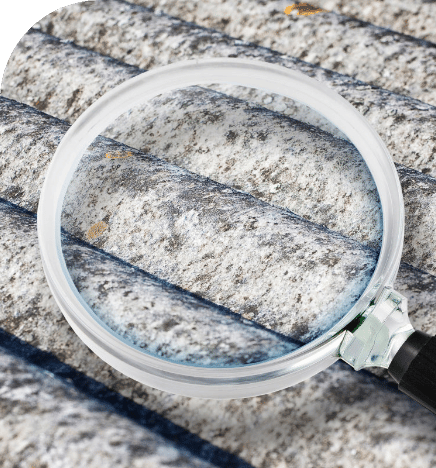Mesothelioma Diagnosis
Diagnosing mesothelioma in a patient who is showing symptoms is a multi-step process. It involves discussing the patient’s medical history and past asbestos exposure, along with testing via chest X-rays, CT scans, and biopsies. Since mesothelioma is rare, it is often recommended to obtain a second opinion to ensure a correct diagnosis.
Home » National Mesothelioma Law Firm » Mesothelioma Cancer » Mesothelioma Diagnosis
How Is Mesothelioma Diagnosed?
Mesothelioma diagnosis begins with a review of your medical history, which may include a discussion of your mesothelioma risk factors, especially your history of asbestos exposure. The doctor will perform a physical exam and begin imaging studies, which are discussed below.

Chest X-Rays
Your Doctor may order a chest X-ray if you have respiratory symptoms. If you have pleural mesothelioma, the X-ray may show areas where the pleura are thickened or have areas of calcification, which indicate inflammation. These changes may be suggestive of cancer but cannot establish what type of cancer it is.

Computed Tomography Scan (CT scan)
This scan produces detailed 3D images that allow doctors to more precisely visualize a tumor and look for any additional tumors. Contrast dye, which is injected into a vein in order to make certain structures more visible, is sometimes used. A CT scan of the abdomen is a common first step in the diagnosis of peritoneal mesothelioma. For patients with pleural mesothelioma, CT scans of the chest are often used to follow up on a concerning finding on a chest X-ray.
Blood Tests
While there are no definitive biomarkers for mesothelioma, certain blood tests can indicate the possibility of mesothelioma. The following blood factors are commonly higher in people with mesothelioma:
- Elevated levels of the glycoprotein Fibulin-3
- Elevated levels of Osteopontin, another glycoprotein
- An elevation of soluble mesothelin-related peptides on cell surfaces
Soluble mesothelin-related peptides are the most studied biomarker. They may be elevated for years before mesothelioma is diagnosed. This test is marketed under the brand MESOMARK. Unfortunately, it suffers from low sensitivity in testing, making the test unreliable if the results are negative.
While these tests can be useful, none is scientifically proven to reliably test for mesothelioma.

Biopsies
Many types of biopsies are used for diagnosing mesothelioma.
Core Needle Biopsy
Fluid Biopsy
Thoracentesis
Paracentesis
Endoscopic Biopsy
Thoracoscopy
For pleural mesothelioma diagnosis, the most common procedure is a thoracoscopy. Through small incisions in the chest wall, the surgeon can visualize the inside of the thoracic cavity to look for tumors and obtain one or more biopsy samples.
Laparoscopy
Open Surgical Biopsy
In some cases, when an endoscopic biopsy isn’t enough, an open surgical biopsy may be needed. This involves making a larger incision to allow the surgeon to see the inside of a body cavity directly rather than through a scope. For pleural mesothelioma patients, the procedure used is called a thoracotomy, while for peritoneal mesothelioma, it’s a laparotomy.
Tests for Staging
Mesothelioma staging is an important part of a mesothelioma diagnosis. Staging is the process of determining how advanced the cancer is. It is crucial in creating a treatment plan because cancer treatment options are different in an early stage from in an advanced stage.
The stage of mesothelioma is determined by the tumor size at diagnosis, whether it has spread to the lymph nodes, and whether it has spread to distant locations in the body.
Doctors may use additional imaging studies for staging mesothelioma.
Magnetic Resonance Imaging (MRI)
An MRI may be helpful in localizing tumors and checking for additional tumors around the body. MRI scans sometimes involve the use of contrast dye.
Positron Emission Tomography Scan (PET scan)
PET scans use a tracer to look for malignant cells. This is helpful in determining whether the cancer has spread to lymph nodes or has undergone metastasis, or spread to other parts of the body.
CT Scans
CT scans make a detailed cross-section of your body to show if the cancer has spread to other organs. A CT scan can identify the exact locations of mesothelioma in your body.
Biopsies
A needle biopsy may be used to determine whether cancer has spread to the lymph nodes.
A mediastinoscopy may be used to confirm cancer has spread to the lymph nodes if other testing suggests this may have occurred. During a mediastinoscopy, a scope is inserted into the tissue in the center of the chest, known as the mediastinum.
Pathology Testing
Mesothelioma occurs in a variety of cell types and sub-types. Each of these has characteristics that affect your treatment options and prognosis. After your initial diagnosis, your doctor will order histology testing to narrow down your diagnosis to one of the following mesothelioma cell types:
Cytology studies will also be performed to identify even more specific data, including the individual cells’ shape, size, and other characteristics.
How Long Does It Take to Get a Mesothelioma Diagnosis?
Although receiving a biopsy result within one to two days is possible, the entire diagnostic process may take several months. Due to the difficulty in diagnosing mesothelioma, you may be incorrectly diagnosed with other more common conditions initially, and you will most likely go through a series of tests each time your symptoms worsen until mesothelioma is finally suspected.
Once a doctor suspects mesothelioma, you may be able to receive a diagnosis within days or weeks. The process of eliminating more common conditions is the primary factor that delays a mesothelioma diagnosis.
Is it Possible to Detect Mesothelioma Early?
It is possible but not common. When mesothelioma starts causing symptoms, it has usually already reached an advanced stage.
There are no established guidelines for mesothelioma screening in asymptomatic individuals. If you are aware that you have been exposed to asbestos, your doctor may recommend that you undergo annual imaging and lung function tests in hopes of detecting mesothelioma early, should it occur.
Early detection of mesothelioma may improve your prognosis. However, medical studies have yet to confirm that any form of mesothelioma pre-screening is beneficial overall. Research into early biomarkers for mesothelioma is ongoing.
Why Is Mesothelioma So Hard to Diagnose?
The diagnosis of mesothelioma is fairly challenging. This is related due to a few different features of this particular cancer.
Symptoms of Mesothelioma
The symptoms of mesothelioma are nonspecific. “Nonspecific” is a term used in medicine to denote symptoms that can be caused by a wide variety of diseases. The symptoms caused by mesothelioma are nearly identical to those of many other respiratory conditions.
Because so many other conditions are far more common than mesothelioma, you may be misdiagnosed—even multiple times—before you receive a correct diagnosis. Pleural mesothelioma, which impacts the membranes surrounding the lungs, may be misdiagnosed as the following:
- Lung cancer
- Drug-induced complications
- Benign pleural mass
- Lung infection
- Scarring of the lungs, or asbestosis
Peritoneal mesothelioma, which is cancer of the lining around the stomach, also presents with vague symptoms, which could result in the following misdiagnoses:
- Peritoneal carcinomatosis
- Serous peritoneal cancer
- Ovarian cancer
- Lymphomatosis
- Tuberculous peritonitis


The Long Latency Period
Mesothelioma typically develops 20 to 40 years or even longer after asbestos exposure. This extended latency period makes it easy to forget about asbestos exposure, so you may not think to inform your doctor that you have been exposed to asbestos. As a result, doctors don’t think to test for mesothelioma.
The Rarity of Mesothelioma
The disease is relatively rare. Mesothelioma makes up 0.17% of all cancer diagnoses in the United States, and there are roughly 3,000 cases diagnosed each year. Doctors learn about mesothelioma in medical school, but they are unlikely to encounter the disease during their careers. Many doctors fail to consider mesothelioma a possible diagnosis, particularly early in the diagnostic process.
Difficulty Identifying Mesothelioma
There is no blood test or imaging test that can definitively diagnose mesothelioma. The only conclusive way to diagnose it is with a biopsy. Even with an adequate tissue sample, pathologists must perform detailed studies and may require a second opinion from a specialist. In addition, mesothelioma often resembles other types of cancer under a microscope.
These factors can contribute to misdiagnosis of mesothelioma and make early cancer detection difficult.
What to Do After a Mesothelioma Diagnosis
Seek Medical Treatment
After a malignant mesothelioma diagnosis, the most important priority is commencing treatment because this cancer grows and spreads aggressively. Since most doctors have little or no experience treating mesothelioma, you will need treatment at a specialized mesothelioma treatment center.
Find Support
Tapping into a support system can help you and your family cope with a mesothelioma diagnosis. You may already be dealing with debilitating symptoms, and if you were still working when you were diagnosed, you may need financial assistance.
Mesothelioma support resources are available to help you with the following:
- Mesothelioma financial assistance
- Spiritual support
- In-home care
- Caregiver support
- Support groups
- Palliative care
- Hospice care
A mesothelioma treatment center can often refer you to these resources, and many provide spiritual and emotional support for patients and families.
Contact a Mesothelioma Lawyer
A mesothelioma diagnosis means you have been exposed to asbestos, which usually means your exposure was extensive. A mesothelioma law firm can help you identify the companies that exposed you to asbestos. We will then help you pursue financial compensation to help with your medical bills, compensate you for your pain and suffering, and provide financial security for you and your family.
Should I Get a Second Opinion?
The American Cancer Society recommends that patients who are diagnosed with rare cancers seek a second opinion. While prompt treatment of mesothelioma is important in order to get the best possible outcomes, you generally do have enough time to get a second opinion and think through your treatment options.
The best way to do this is to make an appointment with a mesothelioma specialist. The National Cancer Institute’s database of cancer centers in the US can help you find a cancer center near you where you can see an oncologist with extensive knowledge about mesothelioma. When you go for your appointment, you should bring all of the records from any testing that you’ve had so far. The oncologist might order some tests a second time, in order to look for particular details that may have been missed on the initial test.
Schedule a FREE Consultation
If you have been diagnosed with mesothelioma, our award-winning mesothelioma lawyers may be able to help you recover substantial compensation. Contact us today to schedule a free consultation.
By submitting this form, you agree to our terms & conditions. Please read full disclaimer here.
Frequently Asked Questions
Below are answers to questions we frequently receive about mesothelioma diagnosis.
When Is My Prognosis Determined?
Your prognosis is determined after your mesothelioma is confirmed and your doctor determines the following:
- The stage of your mesothelioma at the time of diagnosis
- The cell type of your mesothelioma
- Your treatment options
Will I Need Surgery for a Biopsy?
Your doctor may attempt to avoid a surgical biopsy by performing a needle biopsy, but there is a risk that the tissue sample will not be large enough to diagnose accurately. This is a common scenario in mesothelioma cases. If this occurs, a surgical biopsy may be necessary.
Due to this risk, your doctor may opt to perform a surgical biopsy initially. Needle biopsies present their own risks, depending on the location where they are performed. The needle could puncture a lung or your windpipe, causing further complications. Performing a surgical biopsy initially reduces the risk of needing an additional biopsy.
How Early Can Mesothelioma Be Detected?
Mesothelioma can be detected very early if doctors know to test for it. In some cases, it is found incidentally during unrelated procedures.
The problem is that mesothelioma typically does not cause symptoms until it has reached a later stage, and testing generally does not commence until symptoms emerge.
By submitting this form, you agree to our terms & conditions. Please read full disclaimer here.



